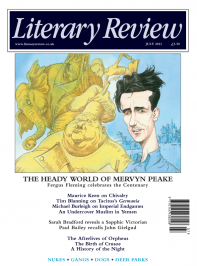Peter Jones
Subject or Object
The Cambridge World History of Slavery: Volume 1, The Ancient Mediterranean World
By Keith Bradley and Paul Cartledge
Cambridge University Press 620pp £110
The Roman jurist Gaius (fl c AD 160) got it in one: ‘The principal distinction in the law of persons is this, that all human beings are either free or slaves.’ We call them ‘chattel’ slaves, as in ‘goods and chattels’, ‘chattel’ being from the same root as ‘cattle’ (property was defined in terms of quadrupeds). In his chapter on Aquilius’s law relating to unlawful killing (287 BC), Gaius begins by discussing the unlawful killing of a slave, a slave-girl or a ‘four-footed beast of the class of cattle’: for legal purposes, they are all one category (Greeks called slaves andrapoda, ‘man-footed things’). The derivation of ‘chattel’ is also cognate with ‘capital’, meaning both ‘punished with death’ and ‘trading stock, accumulated wealth’. The root is the Latin caput, meaning ‘head’ – nothing but head-count mattered.
Or did it? It is easy to assume that slaves were a sort of sub-human species, going mechanically about their probably disgusting tasks all day every day, starved, abused and regularly beaten to keep them up to pace. Whether they worked the mines in Attica or Spain, or

Sign Up to our newsletter
Receive free articles, highlights from the archive, news, details of prizes, and much more.@Lit_Review
Follow Literary Review on Twitter
Twitter Feed
Juggling balls, dead birds, lottery tickets, hypochondriac journalists. All the makings of an excellent collection. Loved Camille Bordas’s One Sun Only in the latest @Lit_Review
Natalie Perman - Normal People
Natalie Perman: Normal People - One Sun Only by Camille Bordas
literaryreview.co.uk
Despite adopting a pseudonym, George Sand lived much of her life in public view.
Lucasta Miller asks whether Sand’s fame has obscured her work.
Lucasta Miller - Life, Work & Adoration
Lucasta Miller: Life, Work & Adoration - Becoming George: The Invention of George Sand by Fiona Sampson
literaryreview.co.uk
Thoroughly enjoyed reviewing Carol Chillington Rutter’s new biography of Henry Wotton for the latest issue of @Lit_Review
https://literaryreview.co.uk/rise-of-the-machinations